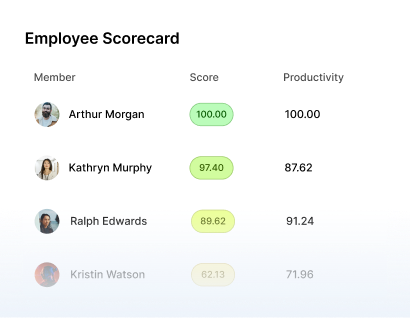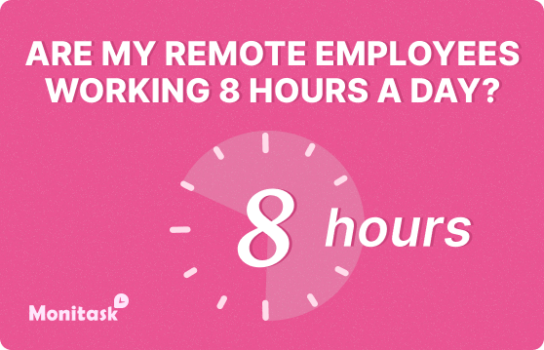
Choose the ideal time-tracking software to enhance your workflow and save time, much like a craftsman picks the perfect tool for a task.
In 2024, while Toggl has been a go-to for many, there are alternatives to toggl-only fish in the productivity sea. You’re after efficiency, affordability, and features that fit like a glove.
Look no further—here are the 15 best Toggl alternatives that’ll help you track time without missing a beat. Whether balancing multiple complex projects or needing detailed reports, these tools are tailored to meet your demands.
Each alternative offers unique advantages, from Monitask’s precision to Paymo’s versatility and Everhour’s integration prowess. Dive into the specifics, weigh the pros and cons, and determine how much bang you’ll get for your buck.
It’s time to enhance your time management game.
1. Monitask
Monitask is an online time-tracking tool that improves team productivity and project management. Monitask is an employee monitoring software used by thousands of clients worldwide, including freelancers, field contractors, and businesses of all sizes.
It offers automated time tracking with screenshots, application and web activity tracking, and detailed statistics for productivity analysis.
The platform supports some operating systems, such as MacOS, Linux, and Windows, while ensuring data security through encryption and ethical monitoring of app usage practices.
Monitask helps businesses gain insights into workload management and improve operational efficiency.
Features:
- Employee productivity tracking
- Time tracking and analysis
- Task assignment integration
- User-friendly interface
- Free plan available
Pro:
- Enhances team performance with robust monitoring
- Integrates task management with time tracking for accountability
- Offers a free plan suitable for small teams
Cons:
- Limited features in the free version
- Can be perceived as intrusive by employees due to monitoring
- Might have a learning curve for new users
Pricing:
- Free plan for teams starting out
- Paid plans with advanced features for growing businesses: Pro $4.99/month/user, Business plan $6.99/month/user.
2. Paymo
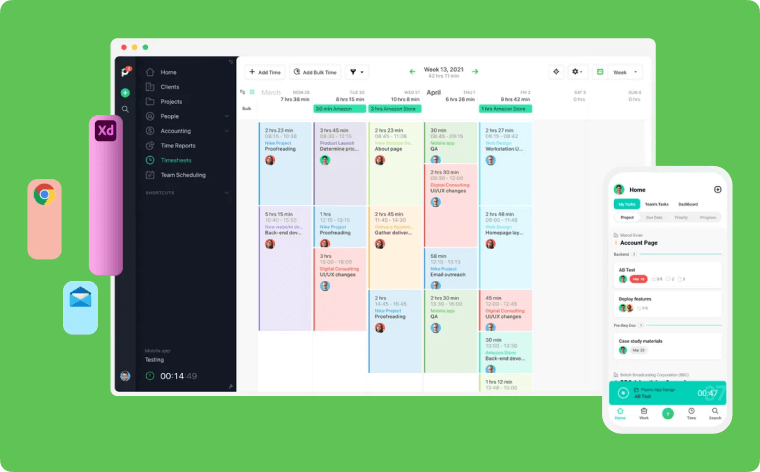
Project management tool with integrated time tracking and billing. Paymo is an all-in-one project management platform that enhances team collaboration and productivity.
It provides tools for task management, time tracking, invoicing, and scheduling, all aimed at streamlining workflows and improving project delivery.
With features like Kanban boards, Gantt charts, and automatic time tracking, Paymo helps businesses track progress, manage resources, and efficiently turn billable time into invoices.
Features:
- Automatic time tracking
- Task management
- Project planning
- Billing and invoicing
- Reporting and analytics
Pro:
- Accurate automatic time tracking ensures that every billable time is recovered.
- Intuitive project management features facilitate task organization and deadline adherence.
- Versatile tool suitable for freelancers and large teams alike, with adaptable reporting for clear insights.
Cons:
- May have a learning curve for new users unfamiliar with comprehensive project management software.
- Advanced features might be overwhelming for those who need a simpler time-tracking solution.
- Potential cost barrier for small businesses or individuals on a tight budget.
Pricing:
- Offers a tiered pricing structure to accommodate various user needs. Start at $ 9.9/month/user and for Small offices, $ 15.9/month/user.
- Provides a free trial to test features before committing to a plan.
3. Everhour
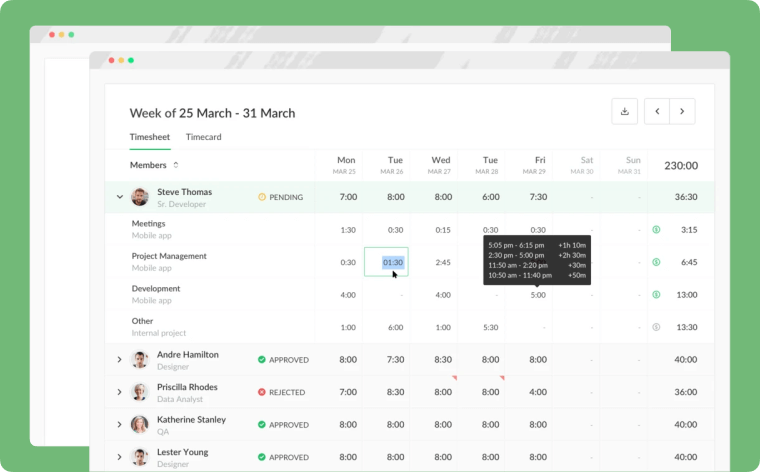
Everhour is an online time-tracking and project management tool that integrates with popular platforms for enhanced productivity and accurate time logging.
Everhour is a comprehensive time tracking and project management tool that offers features such as setting budgets in hours or money, threshold notifications, and detailed timekeeping for tasks and projects.
It integrates with widely used project management tools, offering automatic updates and enabling users to manually track time with a timer or by logging hours.
With an intuitive interface and positive customer feedback, Everhour aims to improve transparency and efficiency and prevent burnout by offering a free trial and easy sign-up with a Google Account.
Features:
- Seamless integration with leading project management tools
- Precise time tracking and budget management
- Detailed, insightful reporting capabilities
- Intuitive and powerful time-tracking software
- Comprehensive toolset ideal for those seeking a Toggl alternative
Pro:
- Offers in-depth reports to optimize team performance
- User-friendly interface simplifies time tracking
- Robust integration capabilities with various platforms
Cons:
- May have a learning curve for new users
- Advanced features could be overwhelming for small projects
- Potential dependency on supported integrations for full functionality
Pricing:
- The clear and concise pricing structure
- Flexible plans to suit different business needs: Free, Lite for $6/month/user, and Team for $10/user/month
4. Humanity TCP Software
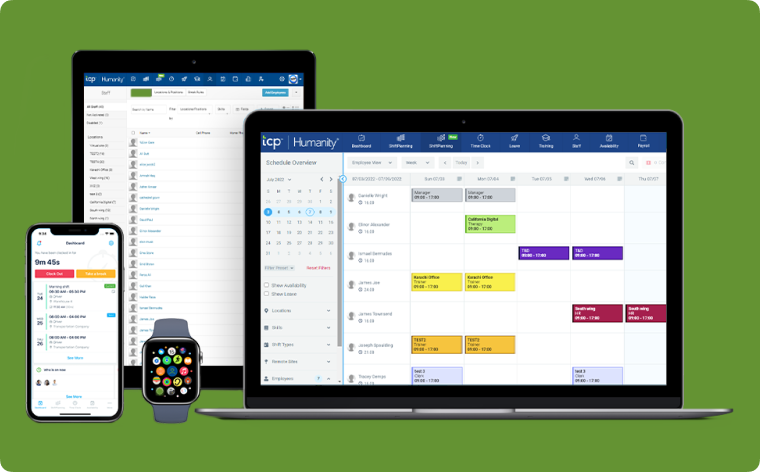
Humanity by TCP Software offers a leading cloud-based solution for dynamic employee shift scheduling, integrating seamlessly with existing HCM platforms.
It provides a user-friendly interface, predictive scheduling technology, and a top-rated mobile app to reduce administrative costs, ensure compliance, and enhance the employee experience.
The software caters to various industries and is part of TCP’s comprehensive workforce management solutions, which serve both public and private sector organizations.
Features:
- Time tracking on tasks
- Workforce management
- Shift scheduling
- Intuitive interfaces
- Performance optimization tools
Pro:
- Efficient time-tracking capabilities
- User-friendly shift management
- Enhances overall productivity
Cons:
- It can be complex for new users
- May include features unnecessary for smaller teams
- The potential learning curve for optimizing all available tools
Pricing:
- The clear and concise pricing structure
- Offers different tiers to suit various business sizes
5. Clockify
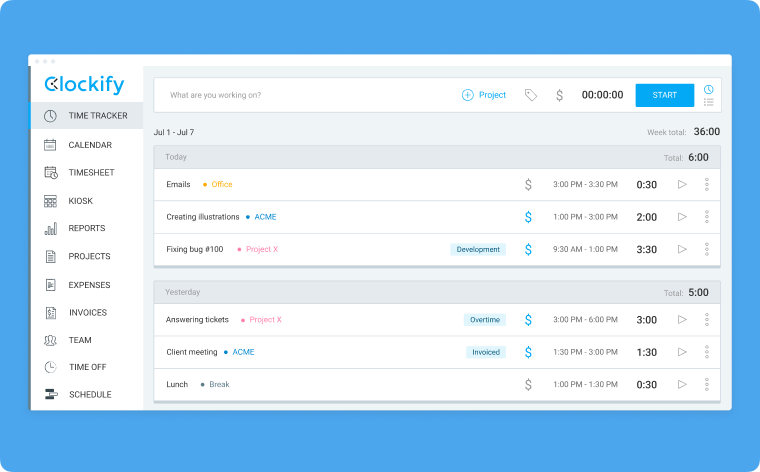
Clockify is a versatile time management tool with features for tracking productivity, attendance, and billable hours through a simple time tracker, timesheet, and calendar.
It provides reporting tools to analyze time usage, project budgets, team activities, and management features for scheduling, leave management, and invoicing.
Clockify is accessible across multiple platforms, including desktop, web, and mobile apps, helping users improve time management, bill clients accurately, and analyze company efficiency.
Features:
- Easy manual time entry management
- Real-time tracking for multiple projects
- User-friendly interface
- Team progress monitoring
- Transparent workflow accountability
Pro:
- Free to use with essential time-tracking features
- Simplifies time management with an intuitive design
- Enhances team accountability and transparency
Cons:
- Advanced features may require a paid subscription
- Possibly limited integrations in the free version
- Can be less feature-rich compared to some paid alternatives
Pricing:
- Offers a free tier with basic time-tracking functionalities
- Additional features and scalability come with paid plans.
6. Nifty
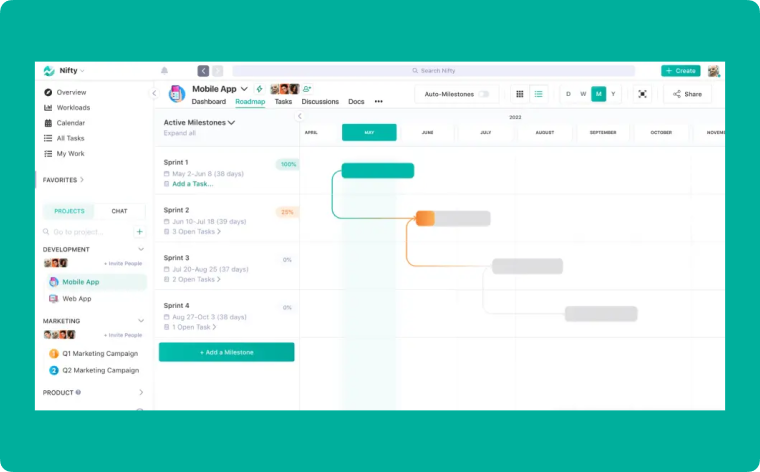
Nifty streamlines project management by merging team collaboration, workflow planning, and progress tracking within one platform.
It offers features tailored for sales, marketing, product development, and client management, including real-time reporting features, milestone tracking, and automated processes to enhance productivity and streamline project execution across different teams.
Features:
- Robust project management capabilities
- Integrated time tracking
- Intuitive user interface
- Seamless workflow integration
- Advanced reporting and insights
Pro:
- Provides a full suite of project management tools.
- Provides detailed reports for time spent and identifying bottlenecks
- Easy to adopt due to its user-friendly design
Cons:
- May have a learning curve for new users unfamiliar with project management tools
- Could be more than needed for teams seeking only time-tracking functionality
- Potential additional cost for groups currently using only a time-tracking tool
Pricing:
- Offers various pricing plans to suit different team sizes and needs, from $39/10 members/month to $399/unlimited members/month.
- Provides a free trial to test features before committing to a subscription
7. Trello

Trello is a project management (PM) tool that helps users and teams manage tasks through boards, lists, and cards, providing a clear visual way to track progress and collaborate.
It provides various views like timelines and calendars to manage deadlines effectively, integrates with other apps, and includes automation features to streamline workflows.
Trello offers a range of pricing options, from a free plan for individuals and small teams to an enterprise plan with advanced features for larger organizations.
Features:
- Intuitive boards, lists, and cards for project organization
- Power-ups for enhanced functionality, including time-tracking integration
- Mobile-friendly interface for on-the-go use
- Seamless collaboration for remote teams
- Flexible and rewarding project prioritization
Pro:
- Highly visual and user-friendly interface
- Extensive customization options through power-ups
- Efficient synchronization across devices
Cons:
- Limited features in the free plan compared to paid versions
- Can become cluttered with too many cards or boards
- Time tracking requires integration with third-party power-ups
Pricing:
- Offers a free basic plan with core features
- Paid plans available with advanced features and integrations
8. Asana

Asana is a task management and project-tracking application that enhances team efficiency and clarity. Also, a project management tool designed to help teams coordinate and manage their work efficiently.
It offers a range of features for task organization, deadline tracking, and collaboration across functions, along with over 200 integrations with popular productivity tools such as Adobe Creative Cloud, Slack, and Google Calendar.
Asana’s platform is highly praised for its ability to streamline processes, automate workflows, and align team efforts with organizational goals.
Features:
- Task assignment and management
- Project timeline tracking
- Resource allocation optimization
- Employee attendance tracking
- Intuitive design for ease of use
Pro:
- Streamlines task assignments and clarifies responsibilities.
- Offers at-a-glance insights into project progress.
- Enhances team resource management to prevent over-commitment.
Cons:
- Can be overwhelming with its range of features for new users
- May not be as focused on time tracking as dedicated tools like Toggl
- Potentially expensive for smaller teams or startups
Pricing:
- Offers a free tier with basic features for individuals and teams
- Paid plans with advanced features, pricing varies based on team size and needs, starting at $13.49/user/month to $30.49/user/month.
9. Basecamp
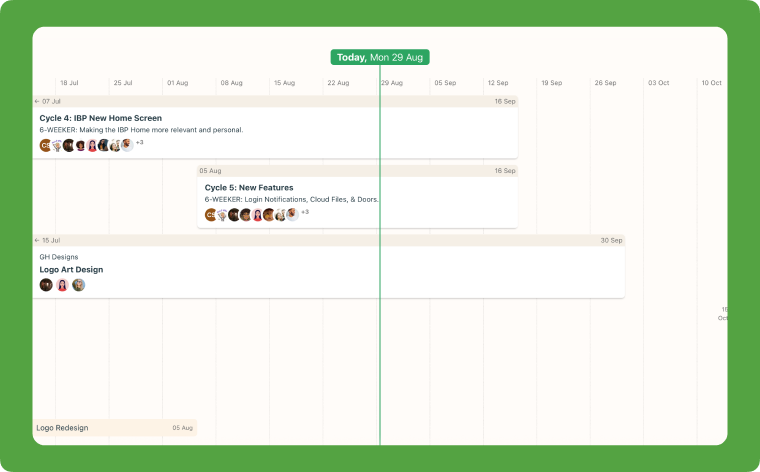
Basecamp is a comprehensive project management (PM) and team collaboration tool offering a range of features such as a Card Table, Hill Charts, real-time chat, and a centralized Docs and files library.
It is designed to streamline project organization on a single page, offering simplified billing and onboarding with an emphasis on minimizing distractions.
The platform has been adopted by diverse industries across 166 countries and is praised for enhancing team communication, organization, and productivity.
Features:
- Centralized project discussions
- File sharing system
- Task management
- Project workflow simplification
- Integration with external time-tracking apps
Pro:
- Enhances team communication by keeping all information in one place
- Reduces clutter and fragmented communication
- Allows for easy integration with time-tracking solutions
Cons:
- Lacks built-in time tracking features
- May not be as feature-rich as some other project management tools
- Not ideal for those seeking complex project management functionalities
Pricing:
- Basecamp offers a simple pricing model
- Contact Basecamp for current pricing details, or visit their website.
10. TMetric
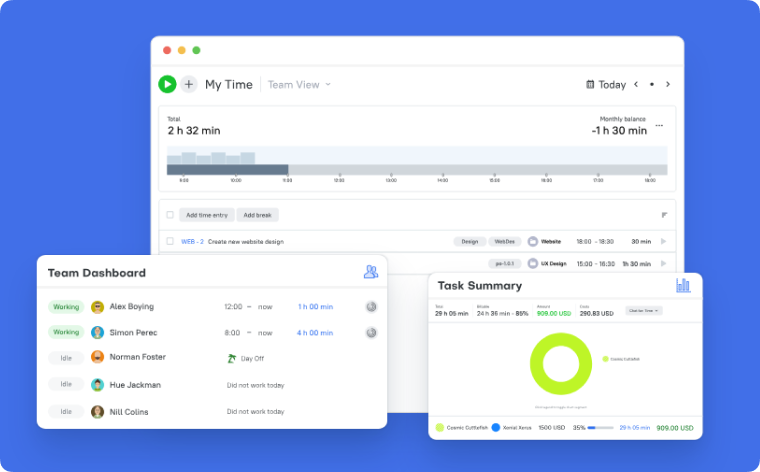
TMetric is a comprehensive time-tracking and project management (PM) tool designed to help individuals and teams capture tasks, manage projects, and measure productivity efficiently.
It offers features like setting billable rates, creating invoices, and tracking progress, along with team management capabilities such as task assignment and workload distribution.
TMetric also supports integration with a wide range of services, allowing seamless workflow synchronization and efficiency improvements.
Features:
- Time tracking automation
- Team progress monitoring
- Task management
- Expense tracking and budget management
- Detailed reporting and timesheet management
Pro:
- Simplifies time tracking with an intuitive interface
- Enables effective resource allocation and budget oversight
- Provides comprehensive insights with detailed reports
Cons:
- May have a learning curve for new users
- Custom pricing could be complex compared to fixed plans
- Features might be overwhelming for small projects or teams
Pricing:
- Offers custom pricing tailored to business needs, starting from $5/user/month to $7/user/month
- No one-size-fits-all pricing aligning with company budgets and requirements
11. Smartsheet
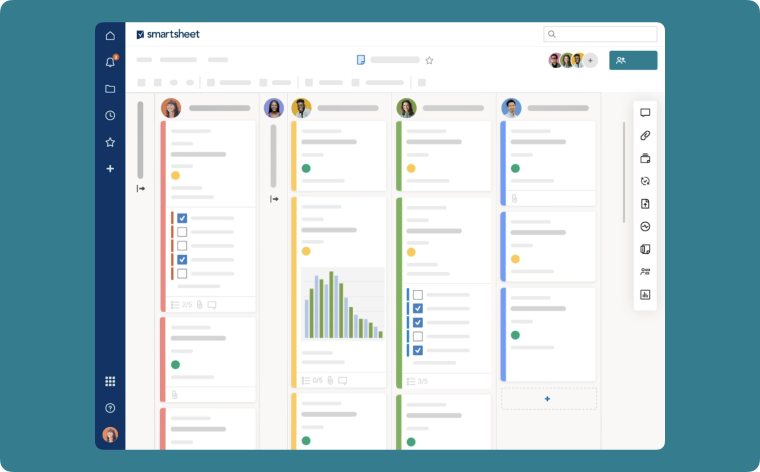
Smartsheet is a dynamic work management platform to help businesses of all sizes capture and manage plans, resources, and schedules through customizable workflows, reports, and dashboards.
It supports teams in accelerating market delivery, empowering marketing efforts, driving business transformation, and fostering growth, with demos and video playback for ease of understanding.
Additionally, Smartsheet provides a robust support community, professional services, and a wealth of resources for users to connect, learn, and maximize the platform’s capabilities.
Features:
- Precision time tracking for billable hours
- Detailed productivity and progress reports
- Streamlined team collaboration tools
- Insightful employee performance analysis
- Customizable project and task management
Pro:
- Accurate tracking of billable hours enhances billing efficiency.
- In-depth reports provide valuable insights into project status and team productivity.
- Enhanced team collaboration features to improve project workflow.
Cons:
- Complex for new users to navigate and fully utilize.
- It may be more expensive than some simpler alternatives.
- An overwhelming number of features could lead to a steep learning curve.
Pricing:
- Range of pricing tiers to suit different business needs, from Pro Plan $9/user/month to $32/user/month.
- Provides a free trial to test out features before committing to a purchase.
12. Monday
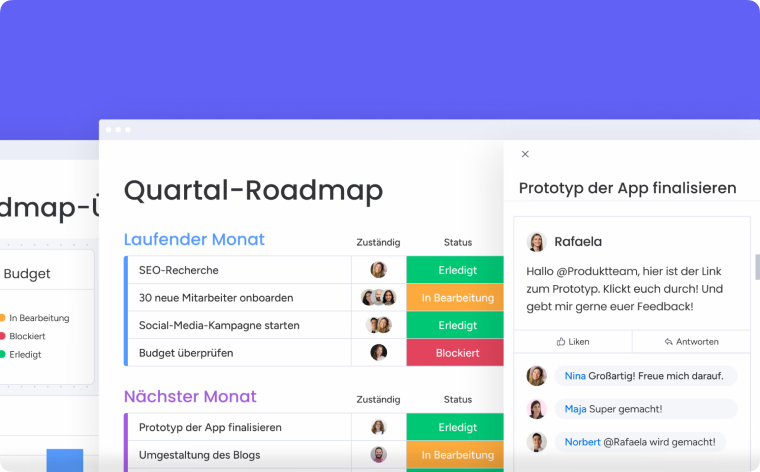
Monday is a versatile Work Operating System (Work OS) that centralizes workflows for various teams, such as creative, software development, marketing, project management, and sales.
It offers customizable boards, multiple views, and integrations to enhance productivity and streamline processes, supported by 24/7 customer service.
The platform is trusted by over 180,000 customers globally and is recognized for its comprehensive workflow management customer satisfaction, and as a market leader in numerous categories.
Features:
- Customizable workflow templates
- Time tracking and task assignment
- Detailed reporting capabilities
- Intuitive user interface
- Robust integration options
Pro:
- Highly customizable to fit different project needs
- User-friendly design that simplifies task management
- Powerful analytics for tracking efficiency and productivity
Cons:
- Its extensive features can overwhelm it.
- May be costly for small teams or startups
- Learning curve for maximizing all available tools
Pricing:
- It offers a range of pricing tiers based on features and team size, from the basic plan of $10/seat/month to $20/seat/month.
- Free trial available to test the platform before committing
13. ClickTime
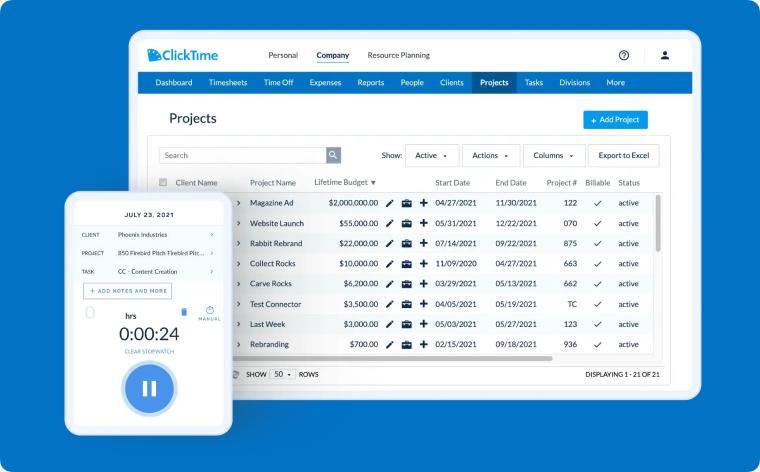
ClickTime is a time-tracking and workforce management tool that helps leaders make informed decisions by quantifying effort and tracking the costs and performance of initiatives.
The platform offers features to increase team productivity, ensure accurate timesheet completion, customize timesheet content, and manage various aspects of employee time, including overtime, expenses, and leave.
Its user-friendly design includes mobile access and data visualization for streamlined decision-making and optimized business operations.
Features:
- Extensive customizable reports
- Multi-user time tracking
- Advanced workflow optimization features
- Scalable basic to advanced plans
Pro:
- Detailed analytics for in-depth insights
- Efficient management of team hours
- Ability to scale with organizational growth
Cons:
- May be complex for beginners
- Advanced features locked behind higher-tier plans
- Potential overkill for tiny teams
Pricing:
- Offers a basic plan with core functions, suitable for starting users. Starter Plam is $10/user/month to $24/user/month.
- Advanced plans are available for more sophisticated needs, with pricing available upon request.
14. Timely
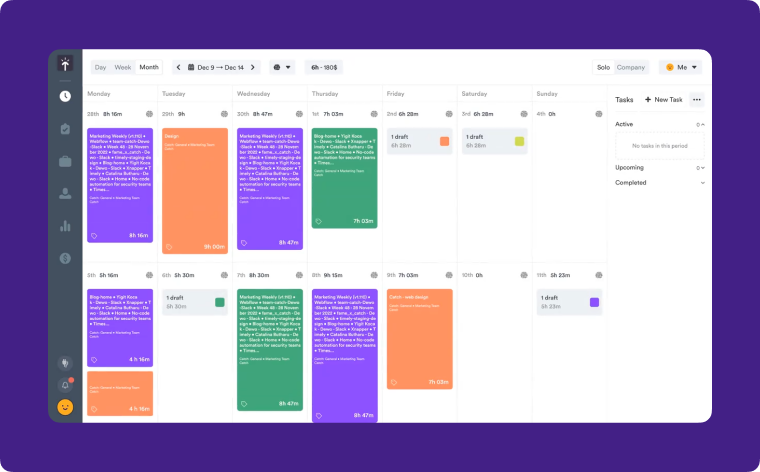
Timely is an automated time-tracking software that simplifies project management and team productivity by tracking time spent on various activities without manual input.
It’s trusted by over 5000 businesses for its privacy-centric approach and provides real-time insights on budgets and work progress with options for native integrations and a free trial.
Features:
- User-friendly interface
- Smart automation for time-tracking
- Integration with other apps
- Real-time insights on project progress
- Performance measurement tools
Pro:
- Streamlines time-tracking with automation
- Easy monitoring of project progress and team contributions
- Accurate, real-time data for informed decision-making
Cons:
- Primarily tailored for small businesses, may not suit large enterprises
- Focus on marketing teams might limit functionality for other industries
- Dependence on app integrations can be a hurdle if compatibility issues arise
Pricing:
- Offers various subscription plans to suit different business needs
- Provides a free trial to test features before purchasing
15. BuddyPunch
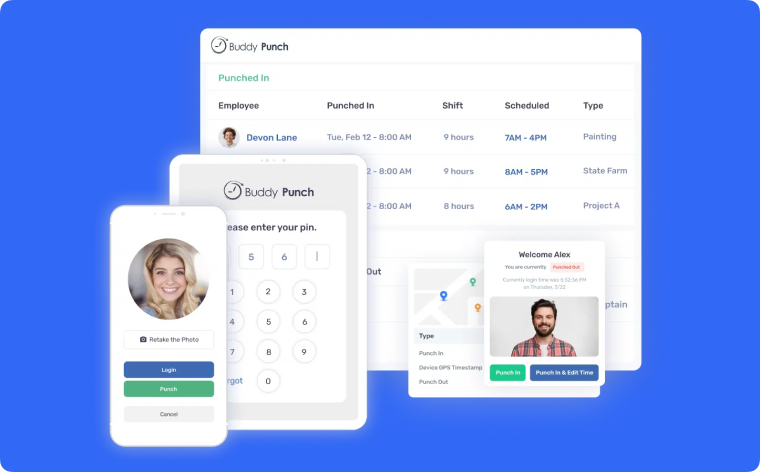
Buddy Punch is an online platform that offers comprehensive employee time tracking and scheduling solutions, streamlining workforce management for businesses of all sizes.
It features real-time attendance monitoring, integration with payroll services, and tools for oversight, such as GPS and image tracking, to ensure accuracy and prevent time theft.
The platform simplifies the payroll process with automated time tracking, time-off management, and easy-to-generate detailed reports, ultimately saving time and reducing costs for employers.
Features:
- Time tracking across unlimited projects
- Scaleable for all team sizes
- Quick setup and management
- Efficient time management
- Designed for various industries
Pro:
- Streamlines efficiency for various projects
- Easy to set up and use
- Scales with team growth
Cons:
- Primarily focused on time tracking, less on other functionalities
- May not cater to particular industry needs
- Paid plans necessary for full-feature access
Pricing:
- Offers scalable paid plans
- Pricing designed to accommodate team sizes from interns to CEOs
Conclusion
In wrapping up, you’ve got a wealth of Toggl alternatives to boost your time management game.
Whether it’s the detailed monitoring of Monitask, the integrated project management of Paymo, or the simplicity of Clockify, there’s a tool tailored to your needs.
Remember, effective time tracking hinges on balancing features with usability and cost with efficiency.
Consider the advantages and drawbacks thoroughly to select the ideal option and boost your productivity significantly.
– The Monitask Team
Frequently Asked Questions
What are the features of a time management system?
- User month reports for performance analysis
- Automated time tracking
- Consistent management across tasks and projects
- Intuitive user interface
- Real-time tracking and detailed reporting
How much does a time tracker cost?
Time-tracking software is often sold as a subscription service, and many providers offer a range of plans to suit different needs. Some time trackers also offer free versions with basic functionalities. As of my last update, here’s a general idea of what you might expect in terms of pricing: For single users, many popular time-tracking apps and tools offer monthly plans ranging from $0 to $15. These plans often include more features than the free versions and may come with better reporting capabilities and customer support. For small to medium-sized teams, plans can range from $5 to $20 per monthly user. These plans usually provide unlimited users and additional features like team scheduling, invoicing, and more detailed reporting.Larger organizations may need enterprise-level solutions that cost upwards of $20 to $30 per user per month or more, depending on the customization, integration, and support required.
What are the pros and cons of time tracking?
Time tracking is a method used to measure and record the amount of time spent on activities.
Pros:
Boosts productivity by identifying inefficient time use
Enhances accountability and ensures tasks and deadlines are met
Enables accurate billing for the time worked
Cons:
May feel intrusive and create a sense of surveillance
Can lead to quantification obsession, hindering creativity
Requires consistent discipline to ensure accurate data
